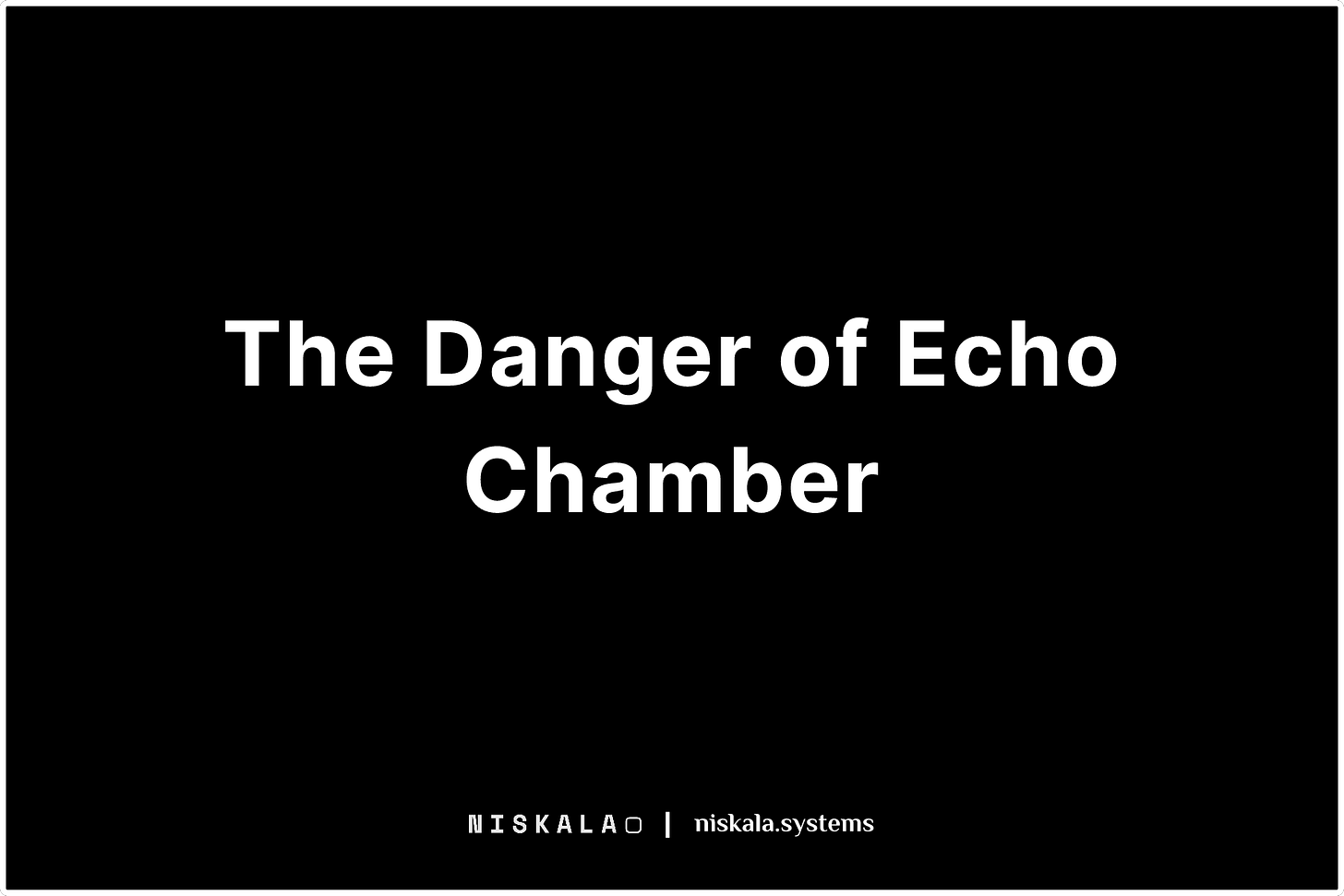Echo Chamber: When Your Mind Becomes a Prison
Why your smartphone is the ultimate yes-man (and how to fire it)
How Personalized Content Became Psychological Quicksand
You scroll. The screen glows. A post confirms your deepest suspicion. Another mocks the idiots who disagree. A meme reduces complex issues to tribal warfare. Your thumb keeps swiping — not because you’re learning, but because you’re being rehearsed.
Welcome to the echo chamber factory, where social media’s invisible hands mold your reality into a hall of mirrors.
Let’s pull back the curtain.
Echo chambers aren’t accidents. They’re engineered ecosystems thriving on three raw materials: your attention, your anger, and your fear of missing out. Platforms optimize for “engagement,” a sterile corporate term for emotional hijacking. Every like, share, and comment trains the algorithm to narrow your world. Think of it as a chef who only cooks dishes you’ve already eaten — but seasons them with escalating outrage so you keep ordering.
The danger isn’t just seeing one perspective. It’s forgetting that other people have perspective too. Studies show that within 48 hours of curated exposure, your brain begins interpreting neutral information as hostile if it challenges your feed’s narrative. You’re not choosing beliefs anymore — you’re defending territory.
The Neurological Trap: How Echo Chambers Rewire Brains
Your prefrontal cortex — the brain’s debate moderator — goes offline in echo chambers. Dopamine spikes when you encounter “proof” your tribe is right. Cortisol floods when dissent appears. Over time, this cocktail trains you to crave moral superiority like a drug. Ever notice how righteous indignation feels physically satisfying? That’s chemical warfare disguised as opinion.
This neural hijacking creates what psychologists call conceptual blindness. You don’t just disagree with opposing views — you literally can’t process them. MRI scans reveal that when entrenched partisans encounter counterarguments, their problem-solving regions deactivate. Emotion centers take the wheel. It’s intellectual road rage with no off-ramp.
Worse yet, echo chambers exploit our tribal wiring. Humans evolved to seek safety in groups. Social media perverts this instinct by making ideology the price of admission. You’re not joining a book club — you’re pledging a digital fraternity where loyalty means never questioning the party line.
The Escalation Engine: How Platforms Profit From Your Polarization
Facebook’s internal research found that 64% of users who joined extremist groups did so because algorithms recommended them. YouTube’s autoplay sends climate deniers to flat-Earth content within five clicks. These aren’t glitches. They’re business models.
Every time you linger on divisive content, you generate data points. Those points refine your “interest graph” — a behavioral map predicting what enrages or delights you. Advertisers pay premiums to target amplified emotions. The angrier the niche, the higher the click-through rates. Your outrage isn’t a byproduct — it’s the product.
This creates a perverse incentive structure:
Stage 1: Platforms identify your emotional triggers through passive surveillance
Stage 2: They test content variations to maximize your engagement (rage-bait headlines beat nuance 14:1)
Stage 3: You’re funneled into micro-communities that reinforce those triggers
Stage 4: Ad ecosystems monetize your inflamed identity
It’s a self-licking ice cream cone of ideological extremism. And you’re the flavor.
Breaking the Mirror: Tactics for Cognitive Freedom
Escaping echo chambers isn’t about reading “both sides.” It’s about rebuilding your information metabolism. Start here:
Map Your Emotional Hotspots
Track what content makes your pulse race. Is it political memes? Celebrity scandals? Pandemic takes? These are your algorithm’s fishing lures. Bookmark them. Then, for one week, intentionally avoid engaging. Watch how platforms scramble to hook you elsewhere.Practice Radical Incrementalism
Follow one account that challenges your views — not extremists, but thoughtful dissenters. Start with 5 minutes daily. Notice when your body tenses. That’s the echo chamber’s immune system attacking foreign ideas. Breathe through it.Create a “Sanity Sandbox”
Build a separate social media profile that only follows experts in fields you know nothing about. Marine biologists. Medieval historians. Quantum physicists. Immerse in contexts where you lack tribal stakes. It’s like mental cross-training.Engage the Human, Not the Hot Take
Next time you see a post that infuriates you, message the creator. Say: “I disagree, but I want to understand your perspective. Would you share the experiences that shaped this view?” Most trolls won’t respond. But the few who do might crack your bubble’s walls.
The Lifeline Beyond the Bubble
Echo chambers thrive on manufactured certainty. The antidote is curious uncertainty — the willingness to hold ideas lightly and interrogate your own reflexes. This isn’t about centrism. It’s about intellectual sovereignty.
When you feel the algorithm’s pull — that gravitational urge to scroll deeper into your own echo — pause. Ask: “Who benefits from me seeing this right now?” The answer is rarely you.
Reclaim your attention. It’s the only currency that matters in the attention economy. Diversify your cognitive portfolio. And remember: The most radical act in a world of mirrors is to seek windows.



